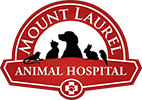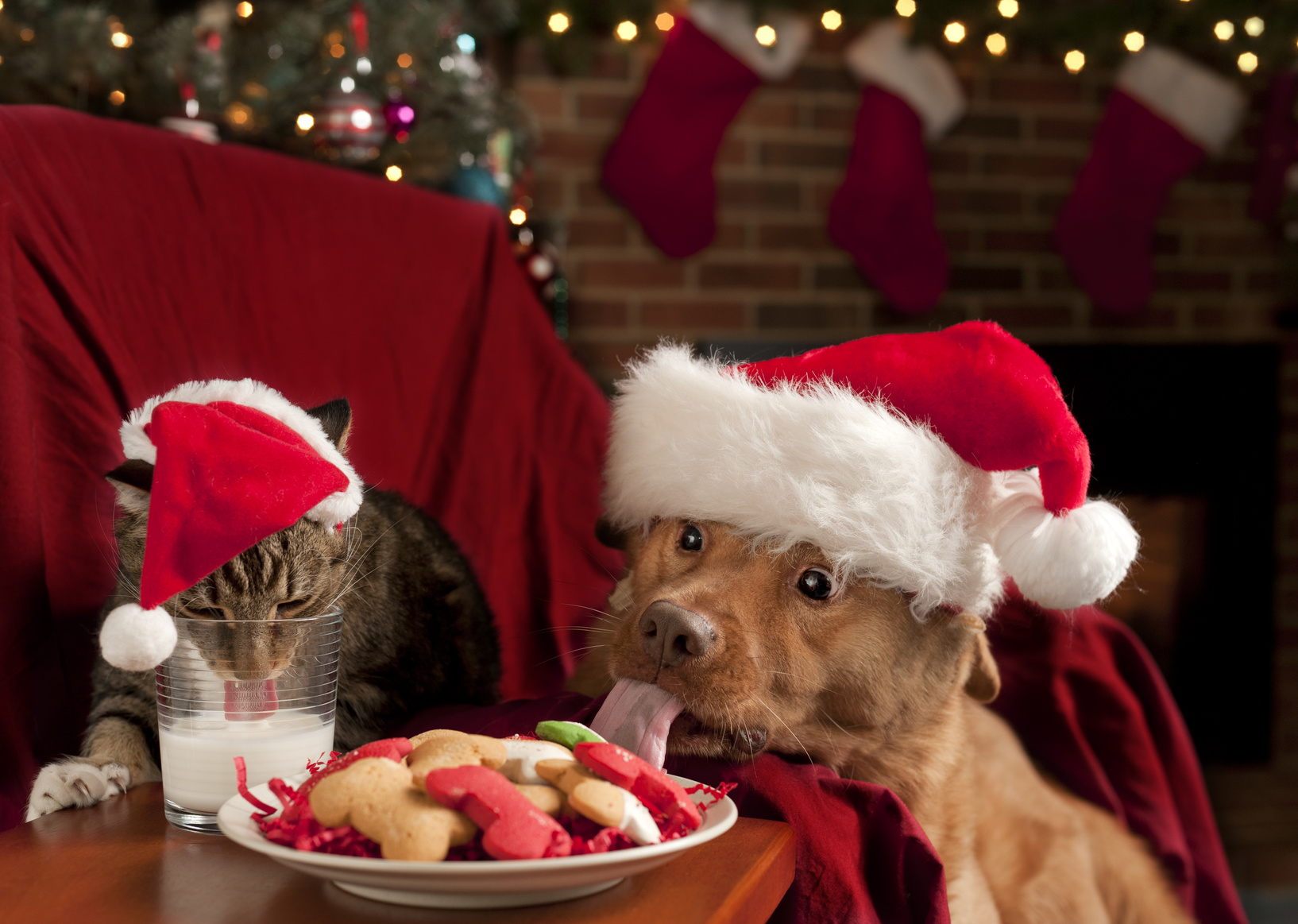The winter and holiday season is here, and so are the phone calls that pets are eating things around the house they are not supposed to. Children are sneaking snacks to the dogs under the table, cats are enjoying the holiday trees and plants, grandma is coming to visit, and we put out ice melt and salts to avoid slipping on the ice and snow. Did you know that a majority of these things, and many others, could be toxic and potentially fatal to your four-legged friends? Hopefully you can gain some insight into what our hospital hears about every winter and want you to be aware of as well!
FOODS
Food equals love, but not in all cases! Some of those wonderful holiday foods and drinks are dangerous for pets. Here are just a few examples:
- Moldy/spoiled foods: The longer leftovers remain in the fridge, the better the chance of bacteria and mold growth. Once fed to your pet, these can lead to liver failure, kidney failure, depression, excessive drinking and urinating, upset stomach, and paralysis. So, please don’t feed your pets leftovers!
- Onions, scallions, garlic, and the like: These foods all cause drastic changes in the bloodstream. Most commonly the result is a severe anemia.
- Yeast dough- Baking cookies and fresh holiday breads for the family can cause another major issue when your pet gets ahold of some. Yeast expands in the stomach just as it does on your counter. When expanded it can become obstructive requiring surgery.
- Sugar free candies, foods, and gum: Lots of goodies are floating around the holiday table including the ever-popular sugar free options. The most common, and extremely toxic, ingredient is Xylitol. It has been found that xylitol in very, very low doses can be fatal to our pets. A single piece of sugar free gum is enough to be fatal for a 50-60 pound dog. Xylitol causes an almost immediate liver toxicity, extreme blood sugar drop resulting in wobbliness and seizures, and widespread hemorrhage throughout the gastrointestinal tract.
PLANTS
Plants are a common gift given during the winter holidays and provide another thing in the house to munch on while you are out of the room.
- Poinsettias: By far, the number one holiday plant that we hear about is the poinsettia. Most people have heard at least once that these plants are toxic, but in fact the most common problems seen when your cat or dog chews off a petal is irritation of the mouth and stomach, mild vomiting, and nausea. This is more than enough reason however to keep them out of reach and contact us if your pet chews on one of these!
- Mistletoe: We all want to be kissed under some mistletoe, but drop it on the floor and let the concern begin. The most common issue with eating mistletoe is gastrointestinal upset, but has the ability to also cause heart and blood vessel related problems.
- Holly: We aren’t talking about Aunt Holly sitting across from you at the dinner table, but the plant! The holly plant has the ability to cause vomiting, nausea, diarrhea, and lethargy.
OUTDOOR PRODUCTS
While ice and snow can be the bane of our existence in New Jersey, we commonly use products to resolve the issue. These products can come at a cost to our pets though!
- Antifreeze: Antifreeze is a sweet tasting toxic substance that most people start putting in their vehicles early before the snow hits. In the smallest of amounts, this substance is fatal. As little as 1 teaspoon can be deadly to a cat, and a few teaspoons to a medium size to large size dog. Please store these tightly and keep your pet away from any spills outside. The toxic ingredient is called ethylene glycol, so look for products including propylene glycol as a safer alternative.
- Ice melts/salts: These products are commonly irritating to the mouth and skin. Some signs of irritation are excessive drooling, depression, and vomiting. The salt within the products can also cause imbalances in electrolytes that require supportive care at the hospital. Many companies are now making salts and ice melts that are pet friendly, so keep your eyes out for those!
DECORATIONS AND HOUSEHOLD ITEMS
Who doesn’t love to decorate their living room? While these decorations are not all toxic, they each pose some form of danger to your pets. Keep these in mind while decorating this holiday season!
- Holiday tree water: Most trees are grown on larger farms that use fertilizers for improved growth. These fertilizers are taken up into the roots and trunk of the tree. When you put that tree into the water the potential for fertilizers to seep into the water is there. Fertilizers can cause stomach upset. Besides the fertilizers, most of that water remains for a few weeks becoming stagnant and the perfect breeding ground for bacteria, which will also lead to gastrointestinal upset.
- Ribbons and tinsel: Oh the shiny things our pets like to eat! Did you know that once your pet starts to swallow something, like a piece of ribbon or tinsel, they actually do NOT have the ability to stop? Of course a long piece of this makes its way to the intestines and can cause an obstruction, which has your pet spending the holiday with us.
- Liquid potpourri: We all love the smell of those scented oils that remind of us grandma’s kitchen or the bakery down the street, but they also come with a hazard to your pet. Not only are they extremely hot, but also result in severe oral, skin, and eye damage.
- Medications: Guests will be arriving at your house any day now, so be sure that if they are toting along their medications that they are properly stored. Many human medications are very toxic to pets, either due to their high doses or many other reasons. Please call us if your pet gets into someone’s medications.
If for some reason your pet does get into one of these potential holiday hazards, please contact us immediately or the ASPCA Animal Poison Control Center at 1-888-4ANI-HELP or www.apcc.aspca.org.
Author: Dr. Marissa Burns

